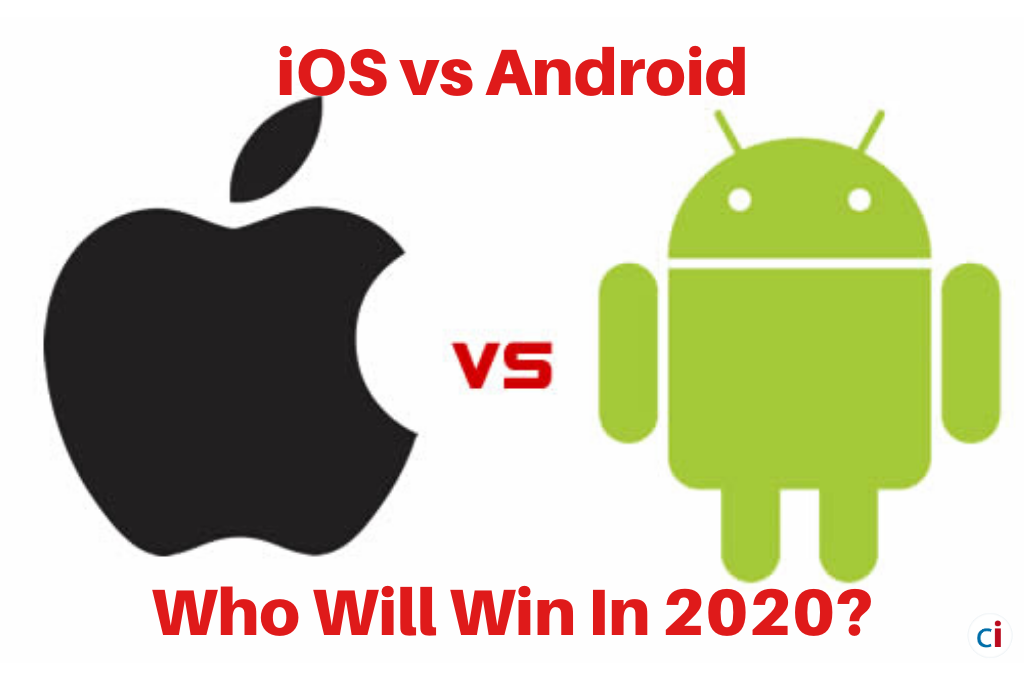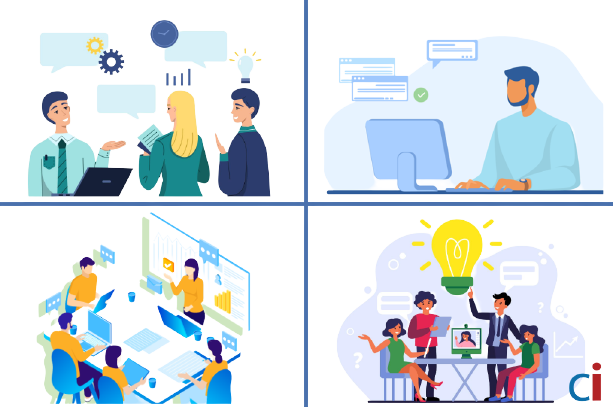Every year, a large number of startups appear in the market. But for startups, the road ahead is never smooth as they have a lot of challenges to face. Due to their limited resources, they have to think twice before making a decision.
Today, there are more than 5 billion unique mobile users across the world. If a startup is looking forward to have a mobile app, then choosing between Android or iOS platform is not an easy decision. The choice is influenced by certain factors. These factors are discussed below to help not only startups, but businesses of any size, in deciding whether to go for Android or iOS.

Market Share
More market share of a mobile operating system means more mobile users are using that operating system. According to the statistics released by StatCounter, in November 2019, the share of Android in the mobile operating system market worldwide was 75.85%, whereas iOS had a share of 22.87%.
In November 2018, the share of Android in the mobile operating system market was 72.35%, whereas iOS had a share of 24.44%. According to Statista, in the 3rd quarter of 2019, there were 2470000 apps available in Google Play store, while in Apple App store, there were 1800000 apps.
According to App Annie Market Forecast 2016–2021, in the year 2021, there will be 196 billion annual downloads from Google Play store, while from iOS store there will be 42 billion downloads.
Android is a clear winner in the mobile operating system market share worldwide and it is expected to remain so in the years to come.
Audience
If you want to target global audience with your mobile app, Android may be the best way to do so. If you want to target users in North America, Western Europe or Australia, you may consider iOS over Android. Android is preferred by users in Asian, African and Latin American countries. iOS is more likely than Android to be used for e-commerce and enterprise apps.
Generally, women prefer iPhones over Android phones, whereas men give preference to Android. Users of iOS-based mobile phones tend to be younger and more affluent than those of Android phones.
Users who prefer iOS tend to have higher education degrees, are more likely to be in professional and managerial jobs, and tend to earn more money than Android users.
Revenue
iOS users usually are more engaged with their phones and use them to do more shopping than Android users. Users of iOS phones tend to be more willing to pay for apps, while Android users usually go for free apps with in-app ads. Apple users tend to spend more on apps and make more in-app purchases.
If a business wants to monetize its app by means other than in-app ads, then iOS may be the best choice. Although app downloads that take place at Google Play are much higher than at Apple app store, the revenue generated by Google Play is significantly lesser than Apple App store.
In the first half of 2019, approximately $25.5 billion was spent by users globally on Apple App store. This amount is nearly 1.8 times the gross revenue of Google Play store ($14.2 billion) for the first half of 2019.
According to App Annie Market Forecast 2016–2021, iOS store will remain the most lucrative app store, generating $60.3 billion in the year 2021. This will be due to increasing revenue per device from its relatively affluent user base. App Annie also forecasted that the combined revenue of Google Play and third-party Android stores would exceed that of iOS store from 2017 onward due to the steep growth in the installed base of Android devices which would compensate for the lower purchasing power of Android users.
In the year 2016, China beat the United States as the largest iOS app revenue market. App Annie’s mobile app forecast report predicts that in the year 2021, top five countries by mobile app revenue (gross consumer spend) will be the same as were in 2016. These countries in the descending order of revenue are - China, United States, Japan, South Korea, and the United Kingdom.
Development Complexity, Time and Cost
Making an app for iOS is easier, faster and less costly than building an app for Android. According to some experts, time required by a mobile app development company for iOS app development is about 30 to 40% more than that required for Android app development.
To develop an Android app, usually more code is required in comparison to an iOS app. Also, mobile developers have to consider a large range of devices and platforms while building an Android app. In contrast, iPhone app developers do not have to deal with too many devices and platforms.
For faster and smoother app development, whether for Android or iOS, a business should hire mobile app developers who have higher education bachelor degrees that are highly skilled and expert in their domain.
As Apple App store has stringent rules and a longer review process, the approval time for an iOS app may be longer than an Android app.
Customization
As Android is an open-source platform, it allows Android app developers to add more customized features as per the demands of the businesses. Customized features help businesses in better achieving their mobile app development goals. Additional features also help in making apps more user-friendly and provide users a great experience.
Security
Being a closed system, Apple’s iOS operating system is usually considered more secure than Android. Moreover, its source code is not disclosed by Apple to app developers, and the users of iPhones cannot make changes to the code on their Apple phones. This makes it more difficult for hackers to find vulnerabilities on iOS-powered devices.
Android devices use open-source code, which can be modified by the owners of the Android phones. As Android powers so many devices manufactured by different manufacturers, it is a soft target for hackers.
Maintenance
Maintenance of an iOS or Android app is much easier if operating systems are updated timely. According to Business Insider, more than half of all Android devices are running versions of Android operating system that are more than two years out of date. Most of the iOS devices run recent versions of iOS operating system.
Android vs. iOS
| Factor | Android | iOS |
| Market Share | Share of Android in the mobile operating system market worldwide (November 2019): 75.85%. | Share of iOS in the mobile operating system market worldwide (November 2019): 22.87%. |
| Audience | For targeting the target global audience, Android may be the best choice. Android is preferred by users in Asian, African and Latin American countries. | Users in North America, Western Europe and Australia tend to prefer iOS over Android. |
| Revenue | The revenue generated by Google Play is significantly lesser than Apple App store. | Apple App store generates much more revenue than Google Play store. |
| Development Complexity, Time and Cost | Making an Android app is more difficult, slower and costlier than building an iOS app. | Making an app for iOS is easier, faster and less costly. |
| Customization | Being open-source, it is easy to add customized features and functionalities. | Adding customized features is not an easy task in iOS. |
| Security | Android is considered less secure than iOS. | Being a closed system, iOS is considered more secure. |
| Maintenance | Maintenance is less easy than iOS as Android users tend to use outdated operating system versions. | Maintenance is relatively easy as iOS users tend to use updated operating system versions. |
For a mobile app startup, it is best to first develop an app for only one platform, either Android or iOS. By considering the above-mentioned factors, it becomes easier for a business to choose the most suitable platform. After building a strong user base on one platform, a business can confidently move to the other platform.




















.png)






